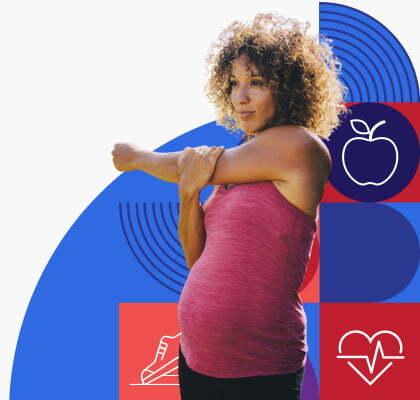Pregnancy
Have a Healthy Pregnancy

The Basics
Overview
Health care during pregnancy is called prenatal care. Getting prenatal care can help you have a healthy pregnancy and a healthier baby. It also lowers the risk of your baby being born too early, which can lead to health problems for your baby.
Doctors who specialize in women’s health, pregnancy, and childbirth are called obstetricians or gynecologists (often called Ob/Gyn). Some nurse practitioners and midwives can also provide prenatal care. A midwife is a health professional who helps women during pregnancy and childbirth.
Get regular prenatal checkups.
Schedule a visit with your doctor or midwife as soon as you know you're pregnant — or if you think you might be. You'll need many checkups with your doctor or midwife during your pregnancy. Don't miss any of these appointments — they're all important.
Be sure to get all the medical tests that your doctor or midwife recommends so you can find any health problems early. Early treatment can cure many problems and prevent others.
Take steps to have a healthy pregnancy.
To keep you and your baby healthy, it's important that you:
- Don’t smoke or drink alcohol
- Eat healthy and get enough folic acid
- Stay physically active
Get more tips for a healthy pregnancy:
Topics to Discuss
Make the most of each visit with the doctor or midwife.
Talk with your doctor or midwife about:
- Your personal and family health history, including any chronic (long-term) health problems or surgeries you've had
- When you need to get medical care for issues that can come up — like high blood pressure, dizziness, swelling, pain, bleeding, or contractions
- When and where to go for emergency care during your pregnancy
- Any prescription and over-the-counter medicines that you take — as well as vitamins, supplements, and herbs
- Healthy weight gain during pregnancy
These visits are also a great time to discuss:
- Questions you have about pregnancy, childbirth, and breastfeeding
- How to get help buying food if you need it — including how to get help from a program called WIC (Women, Infants, and Children)
- Anything that’s bothering or worrying you
If you're worried about your health during pregnancy, don't wait to ask for help:
- Learn more about pregnancy complications and when to call your doctor or midwife
- Find out about warning signs that mean you should seek help right away
Make a birth plan and share it with your doctor or midwife.
A birth plan describes what you want to happen during childbirth and after your baby's birth. It can include:
- Where you'd like to give birth — for example, at a hospital or birthing center
- Who you want with you for support (like your partner, family member, or close friend) before, during, and after childbirth
- How you want to manage pain during childbirth
- Who you want to help you make important medical decisions during childbirth
- Your plan to breastfeed after your baby is born
Learn more about your options for managing pain during childbirth.
Talk with your doctor about depression.
Many women experience depression during and after pregnancy. Talk with your doctor about your risk for depression and whether you need counseling to help prevent it or cope with it.
Medical Tests
Get important medical tests.
During your pregnancy, your doctor or midwife will recommend medical tests that all people need as part of routine prenatal care. You’ll need to get some tests more than once.
These tests give your doctor or midwife important information about you and your baby. The tests will check your blood, urine (pee), or a swab of your vagina and rectum for:
- Rh factor (a protein some people have in their blood)
- Hepatitis B
- Urinary tract infection (UTI)
- Syphilis
- HIV
- Signs of past rubella infections (German measles)
- Group B strep
If you're younger than age 25 years or have certain risk factors, your doctor or midwife may also check for other sexually transmitted infections (STIs), also called sexually transmitted diseases (STDs). Learn more about STIs during pregnancy.
Your doctor or midwife will also check your blood pressure regularly during your pregnancy. They may recommend that you check your own blood pressure at home using a monitor you can buy at a drug store. High blood pressure during pregnancy can be a sign of preeclampsia, a health problem that some pregnant women develop. Learn more about preventing preeclampsia.
Talk about your family history.
Share your personal and family health history with your doctor or midwife. This will help you and your doctor or midwife decide whether you need any other tests, like genetic testing. Find out more about prenatal genetic testing.
Diabetes Testing
Get tested for gestational diabetes.
All pregnant women need to get tested for gestational diabetes between 24 and 28 weeks of pregnancy. Gestational diabetes is a type of diabetes that some women develop during pregnancy.
Pregnant women at high risk for type 2 diabetes may need to get tested earlier in their pregnancy. Find out about your risk for type 2 diabetes.
What do I need to know about gestational diabetes?
Gestational diabetes can lead to health problems for pregnant women and their babies — both during and after pregnancy. It’s important to get tested so that you and your doctor or midwife can take steps to protect you and your baby.
You're at higher risk for gestational diabetes if you:
- Are overweight or have obesity
- Have a family history of type 2 diabetes
- Are older than 25 years
- Are African American, Hispanic or Latino, American Indian, Alaska Native, Native Hawaiian, or Pacific Islander
- Had gestational diabetes during an earlier pregnancy
- Have given birth to a baby weighing over 9 pounds
- Have polycystic ovary syndrome (PCOS)
You can lower your risk for gestational diabetes by being at a healthy weight, eating a balanced diet, and staying active during pregnancy.
Cost and Insurance
What about cost?
Under the Affordable Care Act, insurance plans must cover routine prenatal tests. Depending on your insurance plan, you may be able to get these tests at no cost to you. Check with your insurance company to find out more.
Medicare may also cover routine prenatal tests at no cost. Use this tool to see what Medicare covers.
If you don’t have health insurance, you may still be able to get free or low-cost prenatal care:
- Get connected with free or low-cost services in your state by calling 1-800-311-BABY (1-800-311-2229)
- Find a health center near you and ask about prenatal care
To learn more, check out these resources:
Take Action
Get Prenatal Care
There are lots of things you can do today to help you have a healthy pregnancy and a healthy baby.
Get regular prenatal care.
Plan on getting a prenatal checkup at least once a month for the first 6 months (through week 28) — and more often during the last 3 months of your pregnancy (after week 28). Learn more about prenatal care.
Get important vaccines.
All pregnant women need whooping cough and flu vaccines (shots). Talk to your doctor or midwife about getting other vaccines to help protect you and your baby. Learn more about vaccines to get during pregnancy.
Take charge of your health care.
Speak up and ask questions when you're with your doctor or midwife. When you play an active role in your health care, you help make sure that you and your growing family will get good care. Find out how to take charge of your health care.
Keep track of your baby’s movement.
Sometime between 16 and 28 weeks of pregnancy, you'll probably start to feel your baby move. Keep track of how often your baby moves. If you think your baby is moving less than usual, call your doctor or midwife.
Don't Smoke, Drink Alcohol, or Use Drugs
One of the best ways to protect you and your baby is to stop smoking, drinking alcohol, and using drugs before you become pregnant — or as soon as you know you’re pregnant.
There's no safe amount to drink or smoke while you're pregnant. Both can harm your baby’s health. Talk with your doctor or midwife about ways to help you quit.
It’s best for you and your baby if you quit all forms of tobacco products, including e-cigarettes (vapes). Secondhand smoke (smoke from other people’s cigarettes) can also put you and your baby at risk for health problems. Stay away from cigarette smoke during your pregnancy.
Using drugs during pregnancy — including opioid pain medicines and marijuana — can also put your baby’s health at risk. If you’re pregnant and using drugs, talk with your doctor right away.
Learn more:
Eat Healthy and Stay Active
Get the nutrients you need.
Making healthy food choices and taking supplements as needed can help you have a healthy pregnancy and a healthy baby.
- Check out these tips on healthy eating during pregnancy
- Ask your doctor or midwife if you need to take a daily prenatal supplement during pregnancy
- Take a daily supplement with 400 to 800 micrograms (mcg) of folic acid — folic acid is a vitamin that can prevent birth defects
- Follow food safety tips to keep you and your baby healthy
And keep in mind that you need to eat more during your second and third trimester to help your baby grow. Use this tool to calculate how much food you need during each trimester.
Gain weight in a healthy way.
Gaining a healthy amount of weight during pregnancy is important for both you and your baby. Learn how much weight is healthy for you to gain during pregnancy.
Ask your doctor or midwife about how you can keep your weight gain in a healthy range.
Stay active.
Being physically active can help you have a healthier pregnancy. Aim for at least 150 minutes a week of moderate-intensity aerobic activity — like walking, dancing, or swimming.
If you haven’t been active before, start slow and do what you can! Even a 5-minute walk has real health benefits, and you can add more activity over time.
Get more information about physical activity during pregnancy from these resources:
Prevent Infections
Take steps to prevent infections.
Follow these tips to prevent infections and help keep your baby safe:
- Wash your hands often with soap and water
- Make safe food choices and prepare food safely
- If you have a cat, learn how to protect yourself from toxoplasmosis (a disease spread by dirty cat litter)
- Get vaccines to protect you from whooping cough and the flu
- Avoid traveling to an area with Zika virus — and if you have to travel to an area with Zika, learn how to protect yourself from Zika virus
Get Support and Plan Ahead
Ask for help if you need it.
Being pregnant may be tiring or stressful at times. Extra support from loved ones can help. For example, family members or friends can:
- Provide emotional support so you feel less stressed
- Bring you healthy meals
- Visit the doctor or midwife with you
- Go with you to a breastfeeding or birthing class
- Change the litter box if you have a cat
- Help prepare for the baby’s arrival by setting up furniture
Think about what you need, and don’t be afraid to ask for help.
Plan ahead for the first year with your new baby.
Having a new baby is exciting, but it can be stressful. Take steps to help you prepare for your new baby:
- Create a safe sleeping area for your baby, on a firm, flat mattress without soft objects like blankets, pillows, or toys in the crib. Always put your baby to sleep on their back.
- Talk with your doctor or midwife about newborn screening tests.
- Learn how to breastfeed your baby.
- Know the signs and symptoms of postpartum depression. About 1 in 8 women experience depression after they have a baby. Talk to your doctor or midwife if you have any questions or concerns.
- Make sure to keep up with postpartum visits to your doctor or midwife.
- Talk to friends and family about helping out after the baby arrives. If you don't want visitors, people can support you in other ways, like dropping off food.
Before You Get Pregnant
Not pregnant yet? Plan ahead.
Planning ahead can help you have a healthier pregnancy. For example:
- Take a daily supplement with 400 to 800 micrograms (mcg) of folic acid. Taking folic acid before and during early pregnancy can help prevent certain birth defects. Most multivitamins have 400 mcg of folic acid — check the label to be sure.
- Stop drinking alcohol when you start trying to get pregnant.
- If you smoke, quit smoking when you start trying to get pregnant.
Read about more things you can do to plan ahead.
Schedule an appointment with a doctor or midwife.
- Get your blood pressure checked. If you have high blood pressure, ask your doctor how you can control it before and during your pregnancy.
- If you have a chronic (long-term) health condition, like diabetes, ask your doctor how you can control it before and during your pregnancy.
- Ask about getting vaccines before you get pregnant.
- Talk with your doctor about your family health history, including any medical conditions you have that could affect a pregnancy.
- Talk with your doctor about your risk for depression during pregnancy and whether you need counseling to help prevent it. Learn about depression during and after pregnancy.
- Talk with your doctor about the medicines you take — both prescription drugs and over-the-counter medicines. Some medicines may not be safe to take while you’re pregnant.
- If you take opioid pain medicine, talk with your doctor about how to protect yourself and your baby. Learn more about opioids and pregnancy.
Content last updated January 31, 2025
Reviewer Information
This information on healthy pregnancy was adapted from materials from the Centers for Disease Control and Prevention, the Eunice Kennedy Shriver National Institute on Child Health and Human Development, and the Office on Women’s Health.
Reviewed by:
Katherine Kortsmit
Health Scientist
CDC/DNPAO


